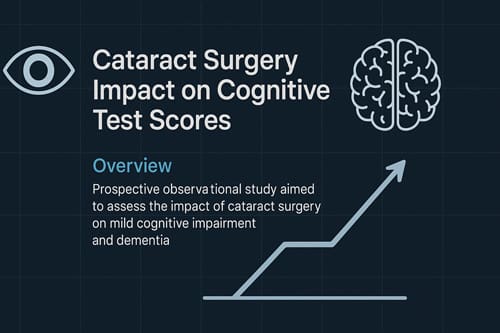Cataract Surgery Impact On Cognitive Test Scores

Overview
This prospective observational study aimed to assess the impact of cataract surgery on mild cognitive impairment (MCI) and dementia in individuals aged 75 years and older. Conducted between 2019 and 2021, the study involved 88 eligible patients who underwent cataract surgery. Cognitive function was evaluated using the Mini-Mental State Examination (MMSE) and the MMSE for the visually impaired (MMSEblind) before and three months after surgery. Patients were categorized into dementia (MMSE≤23) and MCI (23<MMSE≤27) groups based on baseline MMSE scores.
Among the participants, 39 were in the dementia group (mean age, 85.7±4.2 years) and 49 in the MCI group (mean age, 84.2±3.4 years). The MCI group exhibited a significant improvement in MMSE scores (25.65±1.03 to 27.08±1.99, p<0.001) and MMSEblind scores (18.04±1.14 to 19.41±2.01, p<0.001) after cataract surgery. Notably, cognitive function improvement was significantly greater in the MCI group compared to the dementia group (odds ratio, 2.85; 95% confidence interval, 1.02–7.97; p=0.046).
In conclusion, cataract surgery demonstrated a significant increase in cognitive test scores in older individuals with MCI. The study suggests that the likelihood of cognitive function improvement post-cataract surgery may be closely linked to the patient’s preoperative cognitive state, emphasizing the potential benefits of timely surgical intervention for cognitive well-being in this population.
Introduction
Dementia, a debilitating condition affecting memory, language, and cognitive abilities, poses a significant global health challenge, particularly as the aging population continues to grow. With over 50 million people currently afflicted worldwide, this number is anticipated to rise by 10 million annually. Mild Cognitive Impairment (MCI), an intermediate phase between normal cognition and dementia, heightens the risk of dementia development. Given the absence of specific treatments for dementia or MCI, there is a pressing need for exploratory research into cognitive impairment risk factors.
Cataracts, a leading cause of visual impairment among the elderly, have been linked to cognitive impairment in older individuals. Various studies suggest that addressing visual impairment may impact dementia-related outcomes, with evidence indicating a decrease in dementia risk and cognitive function improvement post-cataract surgery. Notably, cataract surgery has shown promise in reducing dementia risk and enhancing cognitive function, although its efficacy in patients with MCI and severe cognitive impairment remains unclear.
This study aims to fill this knowledge gap by investigating cognitive function changes following cataract surgery in individuals aged 75 and older, considering different severities of cognitive impairment. The research hypothesizes that patients with MCI may experience more substantial postoperative cognitive improvements compared to those with severe cognitive impairment. This prospective cohort study, distinct in its focus on diverse cognitive impairment severities, strives to elucidate the impact of cataract surgery on MCI and dementia outcomes, offering valuable insights into potential interventions for cognitive decline in the elderly.
Methods
This prospective observational study, conducted from January 2019 to December 2021, focused on patients aged 75 years and above who underwent cataract surgery at Juntendo Tokyo Koto Geriatric Medical Center (JTKGMC) and Sekimoto Eye Clinic in Japan. The inclusion criteria comprised individuals without prior cataract surgery, aged 75 years or older, and free from ocular diseases other than cataract, with a medical indication for cataract surgery.
Patients received a thorough examination by ophthalmologists, and those meeting the criteria were invited to participate after providing informed consent. A pre-surgery demographic questionnaire collected data on age, sex, marital status, smoking and alcohol history, self-reported hearing impairment, educational level, exercise habits, and general health. Visual acuity measurements, including best-corrected visual acuity (BCVA) and presenting visual acuity (PVA), were recorded both before and three months after surgery. Cognitive function was assessed using the mini-mental state examination (MMSE) and MMSE for the visually impaired.
Exclusion criteria encompassed complications related to cataract surgery, postoperative detection of other eye diseases, absence of follow-up cognitive assessments, and no cognitive impairment (MMSE≥ 28) before cataract surgery. The study adhered to the Declaration of Helsinki guidelines and received approval from the institutional review board of JTKGMC.
The primary focus was on changes in cognitive function, categorized into dementia (MMSE≤23) and mild cognitive impairment (MCI, 23<MMSE≤27) groups based on baseline MMSE scores. Visual acuity was assessed using logarithm of the minimum angle of resolution (LogMAR), and visual impairment was defined as PVA less than 20/40 in the better eye. Other covariates such as age, sex, education level, alcohol and smoking status, marital status, hearing impairment, vigorous exercise, anti-dementia medications, and comorbid health issues were also recorded.
In summary, the study aimed to investigate the impact of cataract surgery on cognitive function in elderly individuals, considering various demographic and health-related factors. The comprehensive approach and adherence to ethical guidelines enhance the validity and reliability of the study’s findings.
Statistical Analysis
The study conducted a comprehensive analysis of various variables related to cognitive function before and after cataract surgery. Descriptive analyses were employed to assess study variables, involving the calculation of proportions for categorical factors and mean ± standard deviation (SD) for continuous variables. The median (interquartile range [IQR]) was determined for cognitive functions, including cognitive domains.
To evaluate the impact of cataract surgery, paired t-tests and Wilcoxon signed rank tests were utilized to compare parameters before and after the surgical procedure. Pearson correlation tests were employed to assess correlations between MMSE (Mini-Mental State Examination) scores and visual acuity pre- and post-surgery. Additionally, the correlation between changes in MMSE score and visual acuity was examined.
Logistic regression models, adjusted for various factors such as age, sex, cognitive function before surgery, visual impairment, smoking history, hearing impairment, and vigorous exercise, were used to estimate associations between improved cognitive function and other variables. The primary model considered a postoperative MMSE score equal to or greater than the preoperative score as the outcome.
Sensitivity analyses were conducted for different scenarios, including exclusion of unilateral cataract surgery, day surgery, incident cataract surgery, and patients taking anti-dementia medications. Additional covariates such as marital status and education levels were considered in certain models. Changes in MMSE score were also examined, with improvement defined as ≥1 point and ≥2 points. Akaike’s information criterion (AIC) and Bayesian information criterion (BIC) were employed to compare models.
Receiver operating characteristic (ROC) curves summarized the overall accuracy of preoperative variables in predicting cognitive function improvement post cataract surgery. Optimal cut-off values for MMSE and MMSE-blind scores for predicting improvement in cognitive function were determined using the Youden index.
STATA/SE 15.0 for Mac was utilized for all analyses, and statistical significance was set at a p-value of less than 0.05. The study design and analyses were conducted meticulously, employing a range of statistical methods to comprehensively explore the relationship between cataract surgery and cognitive function, considering various potential influencing factors.
Result
In this investigation, a cohort of 132 patients who underwent cataract surgery between 2019 and 2021 was scrutinized, with 88 eligible participants included (39 with dementia and 49 with Mild Cognitive Impairment – MCI). The mean age of the entire group was 84.9±3.8 years, 28.4% were male, and the prevalence of visual impairment was 43.2%.
Post-surgery cognitive function and visual acuity changes were assessed. The overall cognitive test scores, measured by MMSE and MMSE-blind, significantly improved after cataract surgery (MMSE: 22.55±4.71 vs. 23.56±5.54, p<0.001; MMSE-blind: 15.34±3.94 vs. 16.11±5.01, p=0.001). In the dementia group, cognitive scores did not change significantly, while in the MCI group, they decreased post-surgery. Visual acuity, measured by LogMAR BCVA, decreased significantly, but LogMAR PVA showed improvement (both p<0.001).
The analysis of cognitive domains covered by MMSE revealed significant improvement after cataract surgery in the whole group and the MCI subgroup. MMSE scores demonstrated a significant correlation with visual acuity both before and after surgery. However, the change in MMSE scores did not correlate significantly with the change in visual acuity.
Logistic regression models indicated a relationship between cognitive improvement and preoperative cognitive function, with the MCI group exhibiting a significant improvement compared to the dementia group. The ROC curves of MMSE and MMSE-blind demonstrated similar predictive capabilities for cognitive improvement after cataract surgery, with no significant difference in the area under the curve (AUC) between the two scores.
In conclusion, the study suggests a positive impact of cataract surgery on cognitive function, particularly in patients with MCI. The findings underscore the potential interplay between visual acuity and cognitive performance, providing valuable insights for clinicians in managing patients undergoing cataract surgery, especially those with cognitive conditions.
Conclusion
The study investigated the impact of cataract surgery on cognitive function in older adults, particularly focusing on different cognitive states such as mild cognitive impairment (MCI) and dementia. The findings indicated a significant improvement in cognitive function following cataract surgery in the entire patient group, as well as specifically in those with MCI when compared to individuals with dementia.
This study contributes novelty by being the first to systematically explore the influence of cataract surgery on various cognitive states in older adults. Previous research had suggested positive correlations between cataract surgery and enhanced cognitive function, with studies employing the Mini-Mental State Examination (MMSE) to assess cognitive changes before and after surgery.
The current investigation corroborated these earlier findings, demonstrating a statistically significant increase in MMSE scores post-cataract surgery compared to pre-surgery values. Notably, the study population exhibited a lower mean MMSE score than previous research, emphasizing the relevance of considering cognitive status at baseline.
The analysis revealed that cognitive improvements were notably associated with the patient’s cognitive state before surgery. Specifically, individuals with MCI experienced cognitive enhancement post-surgery, while those with dementia did not exhibit statistically significant changes. These results suggest that the likelihood of cognitive improvement after cataract surgery is contingent upon the patient’s initial cognitive condition.
Sensitivity analysis models further supported the conclusion that cataract surgery might be more beneficial in individuals with MCI than those with severe cognitive impairment. However, the study acknowledged the need for additional research to explore the potential cognitive benefits in patients with other cognitive states.
The study recognized the MMSE’s limitations in detecting subtle cognitive changes and employed sensitivity analyses to address this challenge. Models indicated borderline significance, emphasizing the complexities in determining what constitutes a clinically relevant improvement in MMSE scores.
Notably, the study identified a potential MMSE score threshold (23 points or higher) for predicting improved cognitive function post-surgery. This threshold aligns with conventional values used in dementia detection.
While the study found correlations between visual acuity and cognitive function, no significant associations were observed between changes in MMSE scores and changes in visual acuity. The study suggested exploring additional visual factors such as contrast sensitivity, cataract severity, and type to better understand their potential contributions to cognitive improvement post-surgery.
Despite the lack of significant associations between hearing impairment and changes in cognitive function, the study noted a lower prevalence of hearing impairment in the MCI group compared to the dementia group. This observation raises intriguing questions about the interplay between sensory interventions and cognitive outcomes, warranting further investigation.
In conclusion, this study provides valuable insights into the nuanced relationship between cataract surgery and cognitive function in older adults. The results underscore the importance of considering baseline cognitive states and encourage further research to elucidate the potential benefits in diverse cognitive conditions.


